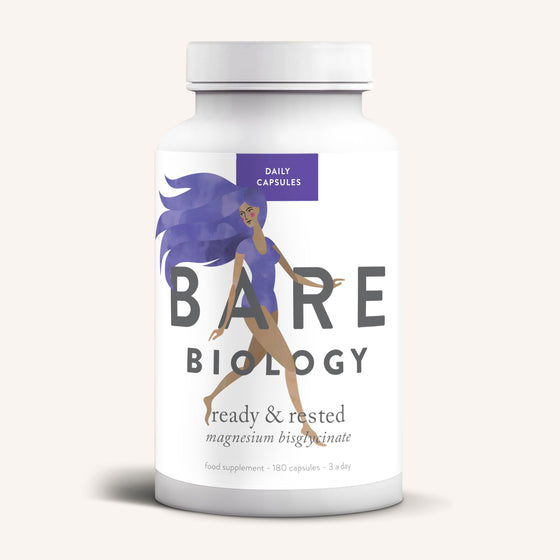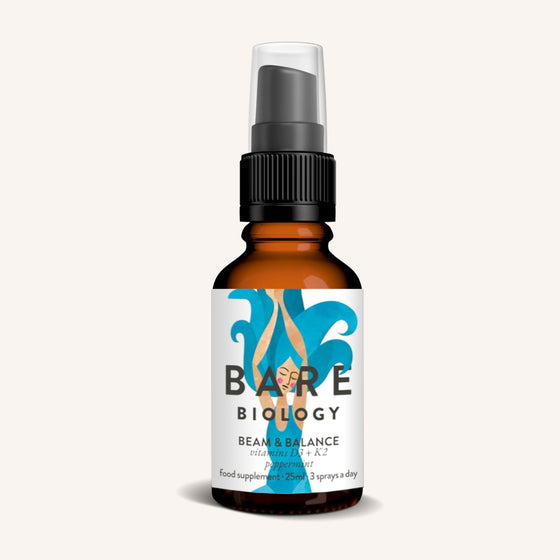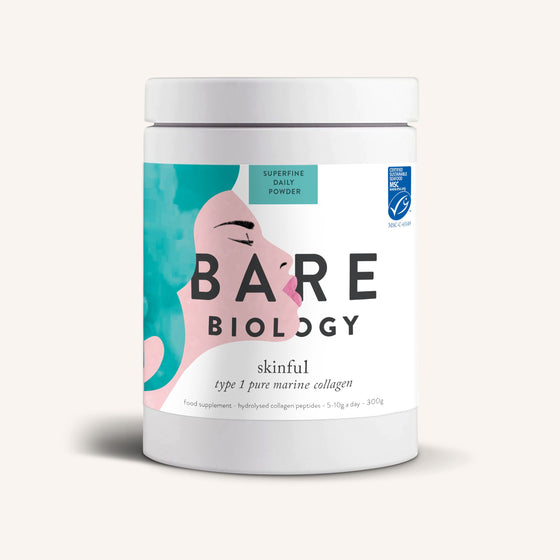Written by registered nutritionist Charlotte Faure Green
Collagen is the most abundant protein in the body, and it isn’t just found in our skin. Collagen is in our bones, muscle tendons, organs, the cartilage between long bones, hair, nails and joints. It’s used pretty much everywhere in the body. Our body’s production of collagen starts to decline in our twenties, which is why you may notice a downturn in your skin’s elasticity (hello, laughter lines) or an inability to bounce back from a knee injury.
For most, taking a high-quality collagen powder like Skinful marine collagen or Fundamental bovine collagen can aid the replenishment of collagen throughout the body.
Can collagen cause low mood, anxiety or depression?
There is some anecdotal concern in the wellness world surrounding the potential for collagen ingestion to induce low mood, depression or anxiety with some people. So how might this happen?
Gelatin has long been used in studies to observe the relationship between reduced tryptophan and mood or behaviour. Tryptophan is the building block for serotonin, our good mood neurotransmitter, and gelatin is essentially collagen broken down.
Tryptophan competes with other amino acids to cross the blood–brain barrier where it can form serotonin in the brain. As gelatin floods the blood with numerous amino acids (but not tryptophan), uptake of tryptophan is heavily reduced as it loses out to the larger number of other amino acids that pass more readily through the barrier. But that tryptophan has to go somewhere so it travels down another pathway for metabolism called the kynurenine pathway.
Simply put, some of the metabolites of the kynurenine pathway are neurotoxic and thought to stimulate the hypothalamic-pituitary-adrenal (HPA) axis, which can present as anxiety and feelings of stress for some. In fact, hyperstimulation of the HPA axis is another of many hypotheses for depression. High cortisol (our stress hormone) output can further deplete serotonin and dopamine (our joy neurotransmitter/hormone).
It’s important to note that acute tryptophan depletion has been studied and researched for nearly 50 years now because it is safe to do so as the effects are temporary – cessation of gelatin found that low mood in those affected was quickly abated, good news!
What's the conclusion?
The tryptophan depletion method doesn’t have the same effect on everybody. Studies have shown a wide range of outcomes, and it is important to recognise that low serotonin does not cause depression or anxiety in most but has the potential to trigger a relapse in some with a history of poor mental wellbeing. In fact, there is no unified theory for how or why depression occurs in some of the population, and the complex relationship between serotonin and depression is just that: incredibly complex.
If you are already taking a collagen powder and have found no impact on your mood, continue but keep this information tucked away for a later date should you need to evaluate a period of low mood and what may have contributed to it.
If you have been taking it and have been feeling unusually low, you may wish to explore whether the collagen has been a contributing factor – simply stop your supplementation and note if you start to feel more yourself again.
Finally, if you are about to include collagen powder into your diet and have a history of mental health concerns, then it may be worth discussing this with a qualified healthcare professional or nutritionist to find the best way forward for your unique body and mind.






